|
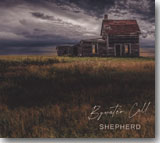 Bywater Call has rapidly become one of my
favorite bands on the scene today, in part
because I firmly believe that Meghan Parnell is
one of the best soulful singers around. This
seven-piece band from Toronto calls its music
Southern soul and roots rock, and I hear
similarities to the Allman Brothers and the
Tedeschi Trucks Band. But with Parnell at the
front of the stage and backed by the
scintillating guitar of Dave Barnes, let's not
compare them to anyone else. They provide their
own unique blend of soul, blues, rock, and a lot
of other sounds that consistently entertain. Bywater Call has rapidly become one of my
favorite bands on the scene today, in part
because I firmly believe that Meghan Parnell is
one of the best soulful singers around. This
seven-piece band from Toronto calls its music
Southern soul and roots rock, and I hear
similarities to the Allman Brothers and the
Tedeschi Trucks Band. But with Parnell at the
front of the stage and backed by the
scintillating guitar of Dave Barnes, let's not
compare them to anyone else. They provide their
own unique blend of soul, blues, rock, and a lot
of other sounds that consistently entertain.
It's
a very tight band, with Bruce McCarthy (drums),
Mike Meusel (bass), John Kervin (keys), Stephen
Dyte (trumpet), and Julian Nalli (tenor sax) all
being first-rate musicians, as can be heard on
the 10 original cuts that make up their new
album, Shepherd (Gypsy Soul Records).
Opening the show is the snaky soul/blues number,
"Everybody Knows," with strong guitar throughout
from Barnes and the shouting vocals of Parnell.
Her range is so impressive, and we'll hear even
more diversity as the album proceeds. "Colours"
is a slow soul anthem that brings out the
singer's more agonized side about a 'hurricane
love' that didn't last. Her pain can be felt
through and through.
"Sweet Maria" gets a funky vibe to start from
Kervin's keyboard, more of a feelgood number
that gives Barnes the chance to break out the
slide for his guitar. For the next cut,
"Holler," you'll want to fasten your seat belt
as Ms. Parnell's voice is going to take us on a
trip through many octaves. It starts out gently
enough with just acoustic slide guitar in the
intro before the rest of the band comes in. Her
voice soars with emotion, while Meusel's
thumping bass carries the beat and the horns
provide a big sound. A great blues number.
We
get another gentle introduction to "For All We
Know,' with just Parnell's voice backed by
acoustic guitar, before Kervin's piano comes in.
Eventually the tempo and volume both start
increasing, but Parnell's voice remains at the
front of the big sound. A highlight here is the
slow, lilting blues "Roll," with gospel-ish
piano from Kervin and a strong slide guitar solo
from Barnes. As we've heard on other songs, the
tempo and volume change as the song progresses
before ending with just Parnell and the backing
vocalists singing the chorus a capella. Terrific
song of encouragement for when life gets the
better of you.
Barnes brings in plenty of slide guitar on the
funky "Turn It Around," another song of
encouragement to someone who needs to truly turn
it around, and curiously the band finishes this
number with Dixieland instrumentation from the
two horn players. Very creative. Parnell shouts
out the vocals to the funky and soulful "Now and
Never," just the kind of song that this band
does best. The horns blast their big sound
throughout the song, with Nalli putting out a
good sax solo while Parnell shouts out the
vocals with the strength and fury that few other
singers can match.
We
get funky again on the powerful "As If," with
polyrhythmic drumming from McCarthy leading into
the guitar and horns coming in strong. It goes
without saying that Parnell is going to blast
out the vocals above the big sound on this
number, and Barnes puts the icing on the cake
with a tasty funky guitar solo with plenty of
effects. I've now used the word funky to
describe several songs, so I guess I need to
amend my description of this band's sound to
include the work 'funk.'
Bywater Call takes it back to New Orleans on the
closing number, "Sign Of Peace," as the horns
open with a mournful, funereal sound before the
second line comes in with great tuba playing. We
also get a very fine trumpet solo from Dyte
while Parnell continually asks for someone to
give her a sign of peace. The tempo increases
one more time as the band turns the song into a
rollicking Dixieland stomper to bring it to a
close.
It's
impossible to classify Bywater Call into just
one musical genre, but why would we want to?
There's a whole lot going on throughout
Shepherd, and it's all great stuff from one
of North America's best up-and-coming bands. If
you aren't hip to these cats, get this album,
and while you're at it pick up everything else
they've recorded. You'll be glad you did.
--- Bill Mitchell
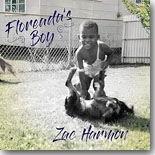 Floreada’s Boy is the third release from
Zac Harmon on the Catfood Records label and
it serves as a reflection of the musical
environment around him while growing up in
Jackson, Mississippi. The 12 songs on the album
include ten written or co-written by Harmon,
plus one classic cover. A rock-solid mix of soul
and blues. Floreada’s Boy is the third release from
Zac Harmon on the Catfood Records label and
it serves as a reflection of the musical
environment around him while growing up in
Jackson, Mississippi. The 12 songs on the album
include ten written or co-written by Harmon,
plus one classic cover. A rock-solid mix of soul
and blues.
Harmon co-produced the album with Christopher
Troy (who also plays keyboards and provided horn
arrangements) and is backed by his core band,
The Drive (Corey Lacy – keys/background vocals,
Nate “The Bass” Robinson – bass, Gino
“LockJohnson” Iglehart – drums, and Kingston
“Guitarboy” Livingston – guitar), plus numerous
guest artists, including SueAnn Carwell on lead
and background vocals, guitarist Caleb Quaye,
and the Texas Horns.
The
opening cut, “Babe & Ricky’s Inn,” is a funky
tribute to the oldest blues club in Los Angeles,
highlighted by Harmon dropping the names of many
of the entertainers who have passed through the
club’s doors over the years during the final
minute of the song. The amusing “Fake News” is
an interesting modernized take on the man trying
to explain his way out of a bad situation, while
“Glass Ceiling” deftly mixes funk and R&B.
Harmon’s cover (with guest vocals from Carwell)
of The Womack’s “That’s The Way I Feel About
Cha” retains the ’70s retro feel of the
original, and the vocals are marvelous. “Stress”
is a tight funk/blues workout, and the steamy
“Sugarman” features the Texas Horns. The slow
burning “Big Dog Blues” really cooks, with crisp
fretwork from Harmon and backing from the L.A.
Horns.
“Lonely Rider” is a strong soul/blues ballad
with a sensitive vocal from Harmon, while “Never
Had a Better Night” mixes blues and funk with
excellent guitar. “I’ll Never Forget” is a
superb slow blues that packs a punch. The album
closer, “Stop The Killing,” is a powerful plea
to stop the reckless violence that plagues
society.
Floreada’s Boy is a seamless fit into any
blues or soul music fan’s collection. Most of us
grew up listening to the same music Zac Harmon,
with this set is a wonderful tribute to that
era. There’s not a bad song in the bunch.
--- Graham Clarke
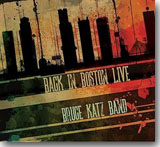 On
March 2nd and 3rd of this year, the Bruce
Katz Band returned to The Fallout Shelter in
the keyboardist’s former hometown of Boston for
Back In Boston Live (Dancing Rooster
Records), an outstanding set that mixes blues,
soul-jazz, and some New Orleans-flavored R&B.
Katz’s career really took off during his time in
Boston, where he worked with Ronnie Earl, Duke
Robillard, Mighty Sam McClain, and many other
area musicians while also serving as an
instructor at the Berklee School of Music during
that time. On
March 2nd and 3rd of this year, the Bruce
Katz Band returned to The Fallout Shelter in
the keyboardist’s former hometown of Boston for
Back In Boston Live (Dancing Rooster
Records), an outstanding set that mixes blues,
soul-jazz, and some New Orleans-flavored R&B.
Katz’s career really took off during his time in
Boston, where he worked with Ronnie Earl, Duke
Robillard, Mighty Sam McClain, and many other
area musicians while also serving as an
instructor at the Berklee School of Music during
that time.
Katz
(piano, Hammond organ, organ bass) and his band
(Aaron Lieberman – guitars, vocals and Liviu Pop
– drums) are joined by bassist Jesse Williams
(North Mississippi Allstars, Jimmy Vivino) on
five of the 11 tracks, which were compiled from
both nights’ performances, recorded in front of
a small audience of fans and friends. Nine of
the tunes were written by Katz, with two covers.
Opening the disc is “The Czar,” a funky
Memphis-flavored instrumental reminiscent of the
old Stax Records recordings from Booker T. & the
MGs in expanded form. Katz moves from organ to
piano and Lieberman handles vocals on a slow
burning take on the Leroy Carr-penned standard
“Blues Before Sunrise” before the band does a
fine interpretation of the Allman Brothers
Band’s “In Memory of Elizabeth Reed” (Katz
played in the bands of Gregg Allman, Butch
Trucks, and Jaimoe).
The
rollicking rock n’ roller “Don’t Feel So Good
Today” features Lieberman on vocals and Katz on
piano, and the wonderful New Orleans workout
“Get Your Groove” is a marvelous showcase for
Katz’s piano playing. He plays solo for over
four minutes before the band joins in. “Gary’s
Jam” is an extended soul-jazz jam track with
Katz on B3, with a brief snippet of Lieberman
borrowing a couple of lines from “Turn On Your
Lovelight.”
The
lovely “Dreams of Yesterday” is a gentle ballad
with Katz on piano and Lieberman adding slide
guitar. The next three tracks are B3-driven
instrumentals --- the soulful “Take The Green
Line,” the acid-jazz of “BK’s Broiler,” and the
stirring “Just An Expression.” The album
concludes with “For Brother Ray,” where Katz
does a solo piano tribute to Ray Charles.
Back In Boston Live is an excellent addition
to the musical catalog of Bruce Katz, one of the
most original and innovative keyboard masters
currently practicing.
--- Graham Clarke
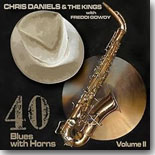 Chris Daniels and the Kings formed in 1984,
with their first album release coming the next
year. Their sound combines the blues with soul,
R&B, and jazz. The Colorado-based band is Chris
Daniels (vocals/guitars), Steve Ivey (drums),
John Thornburg (bass/vocals), Colin “Bones”
Jones (guitars), Bob Rebholz (alto sax/flute)
Darryl “Doody” Abrahamson (trumpet/vocals), and
Darren Kramer (trombone). In 2010, they added
vocalist Freddi Gowdy, who has contributed
mightily to the band’s previous three albums. Chris Daniels and the Kings formed in 1984,
with their first album release coming the next
year. Their sound combines the blues with soul,
R&B, and jazz. The Colorado-based band is Chris
Daniels (vocals/guitars), Steve Ivey (drums),
John Thornburg (bass/vocals), Colin “Bones”
Jones (guitars), Bob Rebholz (alto sax/flute)
Darryl “Doody” Abrahamson (trumpet/vocals), and
Darren Kramer (trombone). In 2010, they added
vocalist Freddi Gowdy, who has contributed
mightily to the band’s previous three albums.
The
band celebrates their 40th anniversary in grand
fashion with their latest release, 40: Blues
With Horns Volume II (Moon Voyage Records),
which features 11 songs performed by the band
with a number of guest artists lending a hand
throughout. The guests include Sam Bush
(fiddle/mandolin), Sonny Landreth (slide
guitar), Tom Capek (B3/keyboards), Christian
Teele (percussion), Steve Conn (accordion/B3),
and Hazel Miller (vocals), with additional
vocals from Mark Oblinger, Linda Lawson, Robert
Johnson, and Kenny Andrus.
The
sparkling “Jump (When My Baby Says)” opens the
set and listeners will be jumping indeed on this
energetic track that sets the bar pretty high.
Fortunately, the rest of the set more than up to
the challenge. “I Like Funky Music,” written by
Gowdy and Larry Wilkins, really packs a punch,
and the delightful soul track, “Everybody’s A
Millionaire,” which has a real Tower of Power
feel with the horns and the upbeat lyrics from
Daniels.
“I
Need Some Good Luck Bad” is a sturdy, mid-tempo
blues penned by Dave Steen (one of two Steen
compositions on the disc) showcasing the rhythm
section’s rock-solid backing, and “Dance Dance
Dance” has a real New Orleans flair, thanks to
the funky groove and horns. It also serves as a
perfect segue to the next track, a terrific
cover of Sonny Landreth’s “Congo Square,” with
scorching slide guitar from the composer
himself.
“Stealin’ Candy” is a gently swinging,
country-flavored track that provides a nice
change of pace, with Daniels, Gowdy, and Miller
sharing vocal duties. Landreth shows up again
for “I Like Your Shoes,” a fun and funky song
about the ultimate sure-bet pick-up line. The
rock-edged “Under Pressure” takes a frank look
at the current state of the union, before the
album wraps on an upbeat note with the jubilant
“When You’re Cool (The Sun Shines All The
Time).”
40: Blues With Horns Volume II is a rich and
varied collection of horn-driven blues, soul,
and R&B. The horn-fueled variety of blues isn’t
heard as often as it used to be, so blues fans
are very fortunate to have a powerhouse band
like Chris Daniels and the Kings doing their
best to keep that sound alive.
--- Graham Clarke
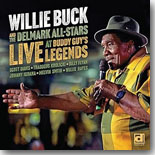 Willie Buck is one of the last of the old
school blues men on the blues scene in the Windy
City. The veteran singer and Delmark Records
wanted to do something very special for his
fourth release, capturing him on stage with a
great band in front of an appreciative audience. Willie Buck is one of the last of the old
school blues men on the blues scene in the Windy
City. The veteran singer and Delmark Records
wanted to do something very special for his
fourth release, capturing him on stage with a
great band in front of an appreciative audience.
Buck
brought his guitarist, Thaddeus Krolicki, and
The Delmark All-Stars (Billy Flynn – guitar,
Scott Dirks – harmonica, Johnny Iguana – piano,
Melvin Smith – bass, Willie “The Touch” Hayes –
drums) joined them at Buddy Guy’s Legends for a
stellar performance on August 28, 2023. Live
At Buddy Guy’s Legends features a mix of
Willie Buck originals with a few well-chosen
Chicago standards, showing the old tiger still
has plenty in the tank.
After the band opens with an instrumental blues
jam (“Jumping”) Dirks introduces Buck, who opens
with the Leiber & Stoller classic “Kansas City,”
leading into several original tunes, beginning
with a couple of shuffles (the rollicking “Tried
To Work Something Out” and “What We Were Talking
About”) and a couple of slow blues (“Let’s See
If We Can Come Together” and “Snow”), all of
which include sparkling musical contributions
from the band.
After a little talk with the audience, including
discussion of an upcoming book about his life,
Buck covers a couple of Muddy Waters tunes,
beginning with “Rock Me,” which also features
some great instrumental interludes, the Delta-esque
“Walking and Swimming,” a descendant of the old
“Catfish Blues” theme, and finally, “Hoochie
Coochie Man,” the Chicago blues anthem (or one
of them, anyway).
Buck
will turn 87 in November and was 85 when this
set was recorded. He sounds marvelous and the
audience really eats it up. The band provides
superb backing throughout, with each
instrumentalist getting a few moments to shine
during the set. Sadly, this was Hayes’ last
recorded session, as he passed away the
following November.
For
a classic live set of vintage Chicago blues,
performed by one of the elder statesmen, blues
fans should look no further than Live At
Buddy Guy’s Legends from Willie Buck and the
Delmark All-Stars.
--- Graham Clarke
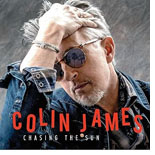 Colin James’ previous release found the
Canadian blues rocker venturing more into the
roots and Americana genres with satisfying
results. His latest effort, Chasing The Sun
(Stony Plain Records), continues in that
direction with assistance from a cast of
all-star musicians including Lucinda Williams,
Charlie Musselwhite, bassist Darryl Jones, and
drummer Charley Drayton, along with guitarist
Colin Linden, who co-produced the album with
James, and the McCrary Sisters. The 11 tracks
include three cover tunes from Williams, Paul
Butterfield, and John Hammond. Colin James’ previous release found the
Canadian blues rocker venturing more into the
roots and Americana genres with satisfying
results. His latest effort, Chasing The Sun
(Stony Plain Records), continues in that
direction with assistance from a cast of
all-star musicians including Lucinda Williams,
Charlie Musselwhite, bassist Darryl Jones, and
drummer Charley Drayton, along with guitarist
Colin Linden, who co-produced the album with
James, and the McCrary Sisters. The 11 tracks
include three cover tunes from Williams, Paul
Butterfield, and John Hammond.
Williams and the McCrarys join James on the
spiritual “Protection,” also written by Williams
a decade ago. Williams and James trade lead
vocals and James and Linden add sizzling
fretwork throughout the tune. The world-weary
“I’m Alive” finds James pleading for a respite
from trying times (Reese Wynans adds B3 on this
track),. Musselwhite joins the proceedings on
harmonica for the bluesy “Devilment,” about a
woman best avoided.
James ventures into soul territory with the
ballad “Crystal Ball,” pondering how things
might be if he knew in advance what was to come,
and “How It Feels To Be Loved,” sounding like a
longlost Memphis soul tune from the ’60s. “Star
Studded Sky” is a sensitive, consoling ballad,
and the lovely “Too Far Gone” dips a toe into
the soul-blues pool, with B3 from Michael Hicks
and backing vocals from Ruby Amanfu.
“In
My Own Dreams,” written by Butterfield, is a
gentle, largely acoustic affair with James and
Linden joined by Janice Powers on keyboards, and
is followed by “This Song Kills Hate,” a gritty,
topical rocker that hews closely to James’ blues
rock roots. Musselwhite teams with James and
Linden on a superb, stripped-down cover of
Hammond’s “Come To Find Out,” before the album
concludes with the haunting, Delta-flavored
“Open Your Mind.”
Chasing The Sun touches on a variety of
genres while keeping one foot firmly entrenched
in the blues. Colin James continues to look
forward and continues to make compelling music.
--- Graham Clarke
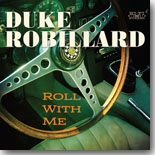 Is
there any more prolific bluesman than Duke
Robillard, not just for the number of albums
in his name or ones released by Roomful of Blues
when he was the leader of that long-standing
band, but also releases that were produced by
him or on which he appeared. I don't know that I
can count that high without an adding machine.
But here's one more, Roll With Me, that
he began putting together in 2005 at the start
of his time with Stony Plain Records. But after
recording nine cuts, Robillard got involved in
other projects and never finished the album.
Until now. Is
there any more prolific bluesman than Duke
Robillard, not just for the number of albums
in his name or ones released by Roomful of Blues
when he was the leader of that long-standing
band, but also releases that were produced by
him or on which he appeared. I don't know that I
can count that high without an adding machine.
But here's one more, Roll With Me, that
he began putting together in 2005 at the start
of his time with Stony Plain Records. But after
recording nine cuts, Robillard got involved in
other projects and never finished the album.
Until now.
Considered to be Robillard's lost album, he
pulled out those nine original recordings and
added three leftovers from other releases. The
result is a great look at Duke Robillard in his
prime. Many of the New England-based regulars
who played with Robillard over the years make up
the backing band on these cuts.
It
took 19 years until we can hear the results of
those sessions, so let's just enjoy them now as
he pays tribute to artists like Gatemouth Brown,
Fats Domino, Muddy Waters, Howlin' Wolf, and
Eddie Boyd, plus some of his own compositions.
Roll With Me gets rolling with Eddie Boyd's
"Blue Coat Man," an up-tempo jump/swing blues,
with a fine sax solo from Doug James and plenty
of tasteful piano from Matt McCabe. "Just Kiss
Me" is a Robillard original, originally done on
the first Duke Robillard and the Pleasure Kings
album, but this time with plenty of horns and a
very strong guitar solo from our star. McCabe
again shines on Fats Domino's "Are You Going My
Way," just oozing of New Orleans. Pam Murray is
wonderful on the trombone; it's a new name for
me, but I'm already declaring her as one of the
stars of the album.
"I
Know You Love Me," from the Big Joe Turner
songbook, is a slow walking blues that also puts
us in New Orleans. "Boogie Uproar" is a very
fast-paced, rockin' instrumental with frantic
guitar from Robillard. The mid-tempo blues,
"Look What You Done," originally was to be
included on the Calling All Blues album,
with Chris Cote imported to handle the vocals
and Sugar Ray Norcia coming in on harmonica.
Howlin' Wolf's "Built For Comfort" was an
unfinished cut from the 2017 Grammy-nominated
Guitar Groove A Rama album, with Robillard
handling the vocals in his own style while Doug
James kills it on baritone sax. The slow blues,
"My Plea," was a Robillard composition that also
wound up on the Pleasure Kings album, with Pam
Murray again carrying a heavy load on trombone.
Cote returns to sing on the up-tempo blues "You
Got Money," with the horn section framing his
vocals and Bruce Bears tickling away on the
ivories.
Murray again stars the Big Joe Turner classic,
"Boogie Woogie Country Girl," leading into
another Robillard original, the slow blues,
"Give Me Back My Money." The show ends with the
jump blues, "Don't You Want To Roll With Me,"
which was Roomful's first single before they
became famous.
Roll With Me can best be described as a fun
album, and it's great that Robillard finally
finished what he started in 2005. It's worth the
wait.
--- Bill Mitchell
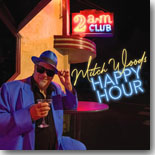 In
much the same vein as the aforementioned album
from Duke Robillard, we have a new one from
boogie woogie piano master Mitch Woods,
Happy Hour (MoMojo Records). When CDs
first became the predominant method of music
distribution, I called albums like this "a party
in a jewel case." I guess I can't use that
phrase anymore since a lot of albums are now
distributed digitally over the internet, but you
get the idea. It's just a fun collection of 13
original songs from one of the best boogie
woogie piano players around. In
much the same vein as the aforementioned album
from Duke Robillard, we have a new one from
boogie woogie piano master Mitch Woods,
Happy Hour (MoMojo Records). When CDs
first became the predominant method of music
distribution, I called albums like this "a party
in a jewel case." I guess I can't use that
phrase anymore since a lot of albums are now
distributed digitally over the internet, but you
get the idea. It's just a fun collection of 13
original songs from one of the best boogie
woogie piano players around.
Recorded at Greaseland Studios in San Jose,
Woods is backed by an excellent group of
musicians,notably Kid Andersen (guitar), Larry
Vann (drums), Dave Somers (sax), and Kedar Roy
(bass).
Every cut is solid, starting with the up-tempo
stomper, "Jukebox Drive," with Woods describing
the 'perfect automobile' while Andersen lays
down a very hot blues guitar solo. Woods does
his best Louis Jordan impersonation on the
rollicking "Broke," before slowing it down for
the late-night blues, "Cryin' For My Baby."
He
also pays tribute to Ray Charles with the
up-tempo blues, "Shakin' The Shack," and keeps
the tempo going with "Mr. Boogie's Back In
Town." "Jump For Joy" kind of defies its title,
as this one is a slow blues on which Woods sings
the refrain "...My baby's the best, yes, she's
the tops, when we start to loving, we never stop
..."
Taking us down to New Orleans is the swampy
"Hattie Green," who is proclaimed as the voodoo
queen who can tear an alligator limb by limb.
Another Crescent City-style number is "Mojo
Mambo," which could have been taken from the
Professor Longhair songbook. He even pays
tribute to the master of New Orleans piano by
urging the listener to do the Longhair shuffle.
Happy Hour started with a car song, so why
not end with one, as Woods sings about wanting a
"Solid Gold Cadillac."
There's more here and it's all solid blues piano
from one of the best around. Happy Hour
is a certifiable party from start to finish,
whether you pull it out of a jewel box or
download it from the internet. However it gets
into your ears doesn't matter as long as it
makes that journey. Well worth the listen.
--- Bill Mitchell
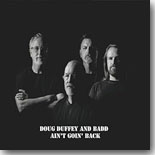 Doug Duffey and BADD return with their
fourth album, Ain’t Goin’ Back, an
11-song set of original tunes that touch on
blues, funk, and soul music with roots in the
southern Mississippi River region, reaching from
Memphis to New Orleans. The band, based in North
Louisiana, consists of Duffey
(vocals/keyboards), Dan Sumner
(guitars/bass/percussion/trumpet/vocals), Adam
Ryland (drums), and Ben Ford (bass). Duffey is a
50+ year veteran of the music world, having
performed all over the world and written songs
by a wide range of artists, including Marcia
Ball, George Clinton, Funkadelic, and Zayika
Hooker. Doug Duffey and BADD return with their
fourth album, Ain’t Goin’ Back, an
11-song set of original tunes that touch on
blues, funk, and soul music with roots in the
southern Mississippi River region, reaching from
Memphis to New Orleans. The band, based in North
Louisiana, consists of Duffey
(vocals/keyboards), Dan Sumner
(guitars/bass/percussion/trumpet/vocals), Adam
Ryland (drums), and Ben Ford (bass). Duffey is a
50+ year veteran of the music world, having
performed all over the world and written songs
by a wide range of artists, including Marcia
Ball, George Clinton, Funkadelic, and Zayika
Hooker.
The
opener, “Whirlpool,” is a moody mid-tempo piece
with harmonica from Dave P. (P-Mo) Moore that
finds Duffey describing his restless mind in
vivid detail. “You Got What It Takes” is a funky
blues about a perplexing dilemma, a woman who
has everything he wants and needs but is it
really what he wants and needs. “The Wishing
Game” is a somber tale of loving someone who
loves someone else who doesn’t love them. Well,
the song sounds better than my explanation of
it, trust me.
The
rowdy “Rock It All Night” picks up the pace
considerably, with Moore returning on harmonica,
with good times seeming to be ahead. “Front
Porch Blues” goes unplugged and sets a lonely
scene of sitting on the porch and watching
things pass by. The piano-driven “Get ‘Er Outa
Yo Head” addresses the frustration of moving on
from a failed relationship, while “Turn It
Around” is a gentle, acoustic ballad about
making changes in life.
The
rock-edged “No Mercy” is a standout, with
stellar performances from the whole band, and
the haunting “Promised Land” finds Duffey
yearning for a better place than where he
currently is. The acoustic “Gallus Pole” has the
feel of an old blues classic, with the musical
accompaniment and the lyrics hinting of
desperation and discouragement,. The title track
finds Duffey looking forward as his only option.
Ain’t Goin’ Back is a rock-solid set with
well-crafted songs and outstanding musical
performances. In short, another winning release
from Doug Duffey and BADD.
--- Graham Clarke
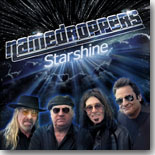 The Name Droppers are a New England-based
group (Bobby T. Torello – drums, Scott Spray –
bass, Ron Rifkin – piano/organ, Rafe Klein –
guitar) with a lifetime of experience in the
music world. Torello served a lengthy tenure in
the Johnny Winter Band, while Spray played with
both Winter brothers, and Rifkin and Klein both
played and recorded with the late Charlie Karp.
Their latest release is Starshine
(Horizon Music Group), an enthusiastic and
interesting set of blues, rock and soul
featuring eight original tracks and two
well-chosen covers. The Name Droppers are a New England-based
group (Bobby T. Torello – drums, Scott Spray –
bass, Ron Rifkin – piano/organ, Rafe Klein –
guitar) with a lifetime of experience in the
music world. Torello served a lengthy tenure in
the Johnny Winter Band, while Spray played with
both Winter brothers, and Rifkin and Klein both
played and recorded with the late Charlie Karp.
Their latest release is Starshine
(Horizon Music Group), an enthusiastic and
interesting set of blues, rock and soul
featuring eight original tracks and two
well-chosen covers.
The
title track kicks off the disc, a jaunty tune
with a retro rock-pop feel, with Klein
singing/talking lead, backed by Rifkin, Torello,
and guest vocalist Simone Brown. The B.B. King
classic, “Sweet Little Angel,” gets a lively
shuffle treatment, with fiery lead guitar and
vocals from Klein, and Torello’s Winter-esque
vocals and drumming drive the upbeat rocker
“Whiskey.”
“Shade of Blue” is a fine soul ballad sung by
Klein with vocal support from Carole Sylvan and
Rifkin, the interesting “I Died, You Cried” is a
humorous number where Klein imagines the
resultant grief expressed at his future funeral.
The blues rocker “Can’t Take It With You” serves
as a sequel of sorts to its predecessor, while
Torello’s gritty vocal fuels the clever “Rotten
Person.”
The
Beatles’ “I Want To Hold Your Hand” is
transformed into a gutsy, mid-tempo blues, with
Rifkin’s vocal backed by guitar work from Karp
and vocalist Brown. Klein takes the mic for the
sorrowful dirge “Red Sea Blues” and the funky
R&B closer, “Joy, Pain, Sky,” which also
features guests Brown, Dave Lowrie on piano, and
guest guitarist Jonathan Dubose.
The
eight original tunes from The Name Droppers are
a lot of fun, and their retreatment of the two
covers are impressive as well. Starshine
is recommended for fans of blues, rock, and soul
who are looking for a fresh take on old grooves.
--- Graham Clarke
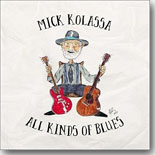 Mick Kolassa recently released his 15th
album in nine years, All Kinds of Blues
(Endless Blues Records). Having lived in the
Mississippi Delta for nearly 30 years, Kolassa
was a member of The Blues Foundation (where the
net proceeds of each of his albums go) and has
been a performer on the blues scene for that
long as well, writing songs prior to recording
his own music. His previous releases have
usually focused on a particular style of blues,
but for this album Kolassa decided to include as
many blues styles as possible, hence the title. Mick Kolassa recently released his 15th
album in nine years, All Kinds of Blues
(Endless Blues Records). Having lived in the
Mississippi Delta for nearly 30 years, Kolassa
was a member of The Blues Foundation (where the
net proceeds of each of his albums go) and has
been a performer on the blues scene for that
long as well, writing songs prior to recording
his own music. His previous releases have
usually focused on a particular style of blues,
but for this album Kolassa decided to include as
many blues styles as possible, hence the title.
Backing Kolassa for this set of 14 original
tracks is a group that will be familiar to most
Kolassa or Endless Blues Records fans. Jeff
Jesen returns as producer and guitarist, along
with Dexter Allen (guitar), Eric Hughes
(harmonica/guitar), Joey Robinson (keys/drums),
Bill Ruffino (bass/percussion), James Cunningham
(drums), Tom Lonardo (drums), Leo Goff (bass),
Rick Steff (keys), Marc Franklin (trumpet), and
Kirk Smothers (sax), along with Doug MacLeod,
who teams with Kolassa on one track.
The
opening track, “Thank You Memphis,” finds
Kolassa acknowledging the city for all it has
done him through good times and bad over the
last 30 years, backed by a big band including
horns from Franklin and Smothers. “Where Love
Takes Me” is a sizzling electric blues that
showcases Allen on guitar and the horns, and the
amusing New Orleans-flavored “Did You Ever
Wonder” was co-written by Kolassa and MacLeod,
who plays guitar and shares lead vocals.
Kolassa ruminates about his next birthday and
several of those preceding it while hoping for
even more of them on the driving shuffle “Too
Old To Die Young.” “Happy Endings” is a jazzy
slow blues with Allen again on guitar and
sparkling piano work from Robinson. “Amy Iodine”
is a modern blues about a different kind of
lover found courtesy of the app store, complete
with Mini Moog keyboard noises from Steff and
old school dial up modem sounds.
The
horn-fueled “You Bumped Me Again” is a funky
blues about a relationship that seems destined
for failure, and “Does Your Mama Know?” mixes
blues with a bit of old school rockabilly, with
solos from Jensen on guitar and Hughes on harp.
The somber “Eating My Soul” is a smoky soul
blues with sax from Smothers, and the acoustic
“I Can’t Sing No Blues Tonight” has a
Mississippi Delta blues feel with Steff’s piano
and Jensen’s slide guitar playing. Jensen’s wah
wah guitar is a featured attraction on “That
Don’t Mean.”
“Somebody Else’s Whiskey” is a humorous track
about someone who may have have had a few too
many. Kolassa and Hughes collaborated on the
country blues, “Bad Decisions,” a clever tune
about a lonely man trying to hook up at a bar,
and Kolassa explains his reasons for moving back
to his native Michigan after three decades away
on the Americana closer, “A Yankee Headed Home.”
Hopefully, Mick Kolassa will find his way back
down south in the future and gives us some more
of his unique and entertaining brand of blues,
or at least give us more from a different
location. As mentioned above, 100% of the net
proceeds from All Kinds of Blues (and the
rest of Kolassa’s catalog) go to The Blues
Foundation, split between the HART Fund and
Generation Blues.
--- Graham Clarke
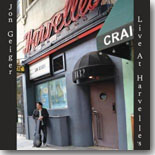 Jon Geiger was born in New York, but became
a longtime member of the Austin music scene
before moving to Los Angeles. He boasts a big,
gritty guitar sound that combines blues, rock,
and jazz with vocals to match. Live at
Harvelle’s was recorded at the Santa Monica
venue with no overdubs or edits, and includes 13
songs over 2 CDs. Jon Geiger was born in New York, but became
a longtime member of the Austin music scene
before moving to Los Angeles. He boasts a big,
gritty guitar sound that combines blues, rock,
and jazz with vocals to match. Live at
Harvelle’s was recorded at the Santa Monica
venue with no overdubs or edits, and includes 13
songs over 2 CDs.
“Bullet” kicks off the set, a blistering Texas
roadhouse tune that incorporates blues, rock,
and jazz while giving the band room to stretch.
“I Dream” is an extended slow blues with more
excellent guitar work and a soulful vocal turn
from Geiger, and “Desert Of My Heart” has a
Zeppelin feel musically and slowly builds in
intensity. The cover of Bill Withers’ “Ain’t No
Sunshine” retains the soul feel of the original,
but Geiger’s vocals and dynamic guitar work
kicks things up a notch as the song progresses.
“The
Voice” is a tough and funky rocker with the Bo
Diddley beat front and center. Geiger’s
interpretation of “Feeling Good” is quite
different from Nina Simone’s more familiar
version, with his reading leaning heavily into
the blues versus her jazzier approach, and the
guitar work is just mesmerizing.
The
first disc closes with a smoking cover of Freddy
King’s “Texas Flyer,” proving Geiger’s time
spent in Austin was well-spent.
The
second disc opens with “Guardian Angel,” which
is a pretty straightforward blues rocker with a
bit of a pop overtone in the lyrics but Geiger’s
guitar work is first-rate. “Prison Of Love” is a
muscular blues shuffle, and the hard-hitting
“Please Don’t Hang Me Out To Dry” rocks hard, as
does “Day To Day,” which slows down the pace,
but not the intensity.
“These Blues” is a gripping blues ballad with
Geiger pulling out all the stops on vocals and
guitar. A super cover of “It’s Not My Cross To
Bear,” from The Allman Brothers Band’s songbook,
wraps up the set.
Live at Harvelle’s is a great set of blues
rock that touches on those two genres, plus a
bit of soul and jazz. Keep your eyes and ears
open for more of Jon Geiger, based on this
powerful release.
--- Graham Clarke
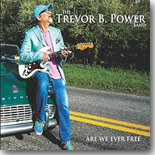 Are We Ever Free (Farm 189 Records) is the
third release from The Trevor B. Power Band.
The New Jersey-based Power wrote all 11 songs,
deftly mixing the blues with a dash here and
there of R&B, rock ‘n roll, and pop, while
providing lead guitar and vocals. Are We Ever Free (Farm 189 Records) is the
third release from The Trevor B. Power Band.
The New Jersey-based Power wrote all 11 songs,
deftly mixing the blues with a dash here and
there of R&B, rock ‘n roll, and pop, while
providing lead guitar and vocals.
Power is also is backed by a superb list of
musicians, including New York Blues Hall of
Famer Dave Fields, who co-produced with Power
and played multiple instruments. Other
contributors include drummer Steve Holley (Paul
McCartney & Wings), Anthony Kirzan
(drums/guitar/vocals), Tom Dicianni (drums), Bob
Lanza and Charlie Macarone (guitars), Tim Timko
and Baron Raymonde (saxophones), and Will Wilde
(harmonica), plus the Califon Chiswick Singers.
The
opening track, “Let Yourself Fly,” is a
pop-flavored rocker that encourages all to
persevere through challenging times. The
hard-charging “Lady Luck” takes more of rock/R&B
edge and “Mystery” leans more toward the blues
rock side of the aisle with Wilde’s harmonica.
The title track finds Power reflecting about the
state of affairs in the country, both past and
present, and “Going To Washington” is a greasy
shuffle that continues the previous theme.
Power ruminates about the experiences of life on
the Southern rocker “Mistakes,” before launching
into a rocking tribute to his convertible, “TR3”
(pictured on the cover with Power), then going
unplugged for “Come On Now,” addressing the
plight of the homeless.
“Trouble To The Core” is the purest blues track
on the disc, both musically and lyrically, “The
Noose” asks listeners to stay positive through
adversity, and the blues rocker, “Man Goes
Blind,” wraps up the disc on an energetic note.
Are We Ever Free covers the bases pretty
well, with its mix of blues, rock, pop, and R&B.
Trevor B. Power writes compelling songs and
backs them up with superb musicianship. This set
should appeal to blues and rock fans equally.
--- Graham Clarke
 The Scott Weis Band has been around for
nearly 20 years, fronted by Weis
(vocals/guitar), Robert Kopec (bass/backing
vocals), and Roger Voss (drums). Live In
Europe is the band’s eighth release, and is
a sound board recording intended to capture the
energy of their live shows with 13 tracks taken
from four shows in Germany during the tour. The Scott Weis Band has been around for
nearly 20 years, fronted by Weis
(vocals/guitar), Robert Kopec (bass/backing
vocals), and Roger Voss (drums). Live In
Europe is the band’s eighth release, and is
a sound board recording intended to capture the
energy of their live shows with 13 tracks taken
from four shows in Germany during the tour.
“Raise Your Hands” kicks off the set in grand
fashion, leading into “All Over Again,” a ballad
of sorts, and both tracks are fine showcases for
Weis’ versatile vocals and guitar work. ZZ Top’s
“Jesus Just Left Chicago” is a great choice for
a cover, obviously the Texas rockers are an
influence, and the cover of Chris Stapleton’s
“Tennessee Whiskey” is an equally inspired
selection, with searing fretwork.
“Pride and Soul” is a jaunty country rocker, and
“Mindless” is a moody slow burner, while “Into
Your Eyes” is a churning mid-tempo piece. Next
is a soulful cover of Sam and Dave’s “Something
Is Wrong With My Baby,” which proves to be a
nice vocal showcase for Weis and gives him ample
space for guitar as well.
“Motherless” is a gritty cover of “Motherless
Child,” with slide guitar from Weis, and “Bitch
Please,” “Right Where It Belongs,” and “Promise
Land” are all tough, crowd-pleasing rockers. The
disc closes with a long but satisfying cover of
Freddy King’s “Have You Ever Loved A Woman,”
prefaced by harmonica from Weis, who also
provides fierce guitar work throughout the
track.
The
only issue is the occasionally muddy sound,
which is to be expected from a sound board
recording (four mics and a two-track sound
board). However, the sound is not so bad that
you can’t feel the intensity of the music and
performances, and it should not be a major
factor in listening for most blues and blues
rock fans. Live In Europe from the Scott
Weis Band is a great, raw set, capturing a blues
rock band operating on all cylinders.
--- Graham Clarke
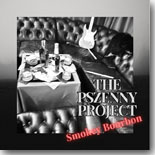 The Pszenny Project’s sophomore effort,
Smokey Bourbon, features
singer/songwriter/guitarist Mark Pszenny backed
by Jay Ellington (bass), Jason Corley (drums),
and Moses Andrews III (keyboards/backing
vocals). The South Carolina-based trio blends
blues with rock, funk and R&B. Pszenny is a
strong guitarist and his vocals are a solid fit
with the band’s sound, while Ellington and
Corley provide rock-solid support. The Pszenny Project’s sophomore effort,
Smokey Bourbon, features
singer/songwriter/guitarist Mark Pszenny backed
by Jay Ellington (bass), Jason Corley (drums),
and Moses Andrews III (keyboards/backing
vocals). The South Carolina-based trio blends
blues with rock, funk and R&B. Pszenny is a
strong guitarist and his vocals are a solid fit
with the band’s sound, while Ellington and
Corley provide rock-solid support.
Smokey Bourbon features a dozen tracks,
seven are remastered versions of songs (with
keyboards added by Andrews) that appeared on
their self-titled debut release last year. Three
of these tracks lead off the disc, the rocking
blues shuffle “I Digress,” the rugged “Trouble
With The Man,” and “She’s Long Gone,” a scrappy
blues rocker. The title track is a new song, a
mid-tempo blues track, followed by “Hoochie
Mama,” one of the standouts from their previous
effort.
Two
new tracks, the rambunctious “Shake It” and the
Texas-flavored roadhouse rocker “I Got Lost”
find the band kicking into high gear, and the
remastered “What The Funk” showcases the band’s
ability to mix blues, funk, and rock. The tender
ballad “Baby Cries” provides a change of pace,
and Pszenny does a nice job on vocals.
The
next two tracks are remastered versions of the
funky “It’s Up To You,” and the boogie rocker “I
Told You,”. The instrumental “Highway Jammin’”
closes the set.
While it would have been nice to have a complete
set of new tunes, the band takes most of the
standout tracks from their debut, and the
remastered versions are first rate. The new
songs are quite good as well, so if you enjoyed
The Pszenny Project’s first release, you will
most certainly like Smokey Bourbon, which
serves as a nice jumping-on point for new fans
as well.
--- Graham Clarke
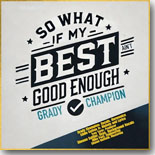 Canton, Mississippi blues man Grady Champion
recently released a single, “So What If My Best
Ain’t Good Enough,” a superb soul/blues tune
that teams Champion (vocals/harmonica) with
songwriter Eddie Cotton, Jr. (guitar) and Simone
Sattler Tyrer (keyboards, background vocals). Canton, Mississippi blues man Grady Champion
recently released a single, “So What If My Best
Ain’t Good Enough,” a superb soul/blues tune
that teams Champion (vocals/harmonica) with
songwriter Eddie Cotton, Jr. (guitar) and Simone
Sattler Tyrer (keyboards, background vocals).
Troy
Tyrer’s crisp production gives the track a warm,
spacious feel that fits the song like a glove.
Champion avows that he’s done the best he can
and his life’s ups and downs have shaped him
into the person that he is, and he’s good with
that.
It’s
been too long since we’ve had a new Grady
Champion album to enjoy and, based on this
excellent track, it will be one worth seeking
out.
--- Graham Clarke
 Back
in 2010, during the recording of a “mega
session” that eventually resulted in two great
albums, Brad Vickers & His Vestapolitans
decided to lay down one more track at the end of
the day, a song written by Vestapolitan Margey
Peters called “Peace In My Time.” The band
(Vickers – bass/vocals, Peters – vocals, Jim
Davis – tenor sax, Arne Englund – piano, Dave
Gross – guitar, Bill Rankin – drums) recorded
the song in one take. Back
in 2010, during the recording of a “mega
session” that eventually resulted in two great
albums, Brad Vickers & His Vestapolitans
decided to lay down one more track at the end of
the day, a song written by Vestapolitan Margey
Peters called “Peace In My Time.” The band
(Vickers – bass/vocals, Peters – vocals, Jim
Davis – tenor sax, Arne Englund – piano, Dave
Gross – guitar, Bill Rankin – drums) recorded
the song in one take.
When
sax player Davis passed away in late November 2022, the
band was pondering his loss and the current
state of world affairs at the time. The members
of the band remembered the track, a somber
reflection of the futility of war and conflict,
and decided to release it as a single on their
ManHatTone label. Despite being recorded nearly
15 years ago, the message is, sadly, as timely
as ever.
--- Graham Clarke
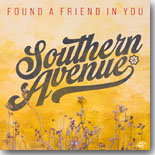 I
was excited to read earlier this year that
Memphis blues/soul group Southern Avenue
had signed a recording contract with Alligator
Records. This is a very diverse group, both
among its members as well as the various styles
of music it incorporates. I was curious how its
affiliation with noted blues label Alligator
would impact their sound. I
was excited to read earlier this year that
Memphis blues/soul group Southern Avenue
had signed a recording contract with Alligator
Records. This is a very diverse group, both
among its members as well as the various styles
of music it incorporates. I was curious how its
affiliation with noted blues label Alligator
would impact their sound.
Based on the first advance track and title cut
from the album, the up-tempo "Found A Friend In
You," it appears that Southern Avenue is going
to be as diverse as ever. This song is blues,
soul, R&B, and even some country mixed in. It
was recorded at Royal studios in Memphis, with
Luther Dickinson joining on bass.
Although Ori Neftali is listed as playing only
guitar in the credits, I hear dobro on the intro
of the song before the members begin harmonizing
on vocals. Lead singer Tierinii Jackson
eventually takes over with her commanding voice.
Towards the end of the song, we get a country
sound with a fiddle break.
This
one song just whets my appetite for the full
album. Southern Avenue has been nominated for a
Grammy in the past, and I have a feeling this
upcoming album just might be in the running
again.
If
you want to catch them live, Southern Avenue
will be on the Outlaw Music Festival Tour with
Willie Nelson, Bob Dylan, and John Mellencamp.
That tells us a bit about the appeal of their
music to a wide range of music fans.
--- Bill Mitchell
 I
became a big fan of Baltimore guitarist/singer
Evan Nicole Bell based on her outstanding
EP released earlier this year (reviewed
here) as well as frequently viewing a
plethora of her YouTube videos. Her first full
album, Shades of Blue, will be out next
month. Until then, two singles have been
released to give us a taste of what to expect. I
became a big fan of Baltimore guitarist/singer
Evan Nicole Bell based on her outstanding
EP released earlier this year (reviewed
here) as well as frequently viewing a
plethora of her YouTube videos. Her first full
album, Shades of Blue, will be out next
month. Until then, two singles have been
released to give us a taste of what to expect.
From
her previous work, I thought of Ms. Bell as a
guitarist first, a pleasant vocalist second. But
on these two cuts her voice shows power and
range that I hadn't heard on her previous work.
Also notable is that she plays all instruments,
except for drums.
"RIver"
projects a very deep south sound, starting first
with Bell's voice emitting an earthy yell with
the sound engineer giving effects to it, while
accompanied by primal drumming. Credit here for
her growling vocals to one of her folk heroes,
Leadbelly. She then comes in with blues/rock
chords on the guitar while the drummer has moved
to more of a second line rhythm . A very
fascinating song.
"It's Not My Cross To Bear" is a slow blues with
more growling vocals from Bell to start while
she also shows off her blues guitar skills.
There's power and range to her vocals with a
little echo in the mix, complemented by a nice
guitar solo over top of keyboard accompaniment.
I'll
say what I did when I reviewed the previous EP.
Great things are ahead for this talented artist.
If these two singles are indicative of what will
be on the full album, Shades of Blue just
may put Evan Nicole Bell on the blues map and
taking her career to another realm.
--- Bill Mitchell
|